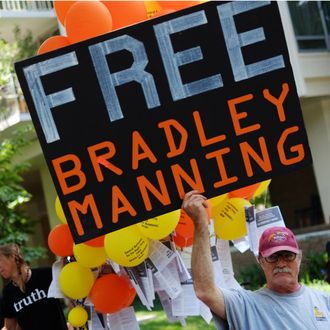
Bradley Manning’s acquittal on charges of “aiding the enemy” for providing WikiLeaks with military documents is “a slight speck of light in the tunnel” that is the Obama administration’s war on leakers, said noted First Amendment attorney James Goodale following today’s verdict. “Maybe we’ve reached the bottom.”
But Manning’s case is not exactly a victory for transparency and the media: The 25-year-old solider still faces decades in prison for violating the Espionage Act of 1917, charges similar to those faced by NSA leaker Edward Snowden. “It’ll be interesting to see whether they bring out this crazy ‘aiding the enemy’ charge against Snowden if they ever get to him,” said Goodale, who represented the New York Times in the Pentagon Papers case and has said the president is as bad as Nixon on the issue. “It may mean that this insane theory is dead.”
But maybe not. “Obama says one thing, and he does another,” said Goodale. “Maybe he’s learned from this that he should not let his Justice Department do it again. If he were really on the ball, he would’ve learned that. But I’m now an Obama disbeliever — I do not believe everything he says. He’s proved himself to be a member of the surveillance Establishment.”
While the relatively restrained Manning verdict “is a tremendously good break for Obama” and his legacy on whistle-blowers, the president “has been behind the eight ball on every single possible claim with respect to national security that has been made over the last three or four months — the NSA, all the reporter matters,” including Times journalist James Risen, who is being pressured to testify against a source. An aiding the enemy conviction, said Goodale, “would just make him fully unbelievable in this area, as far as I’m concerned.”
“In the Pentagon Papers case, we never got to the point of the appropriate penalty for Daniel Ellsberg,” he explained. “My own view is that if you are working for a contractor and you sign up and say you’re not going to leak — regardless of whether it’s for good — one has to expect that you’re going to face a penalty. Indeed, Ellsberg said he thought he was going to face a penalty. But I think the penalty that Ellsburg would have faced is nothing compared to what they’re going to pile onto Manning.”
The verdict, of course, will probably not do much to convince Snowden or Julian Assange to voluntarily come to the U.S. and face trial. “You’ve got Assange sitting there expecting to have his neck cut off,” said Goodale. After the Manning verdict, “I think they have to be feeling a bit better, but not enough to come rushing home,” he said.
As an attorney, if Goodale could pass on any advice, “I’d say, ‘Hey, go ahead and feel a little better, but stay where you are.’”





























